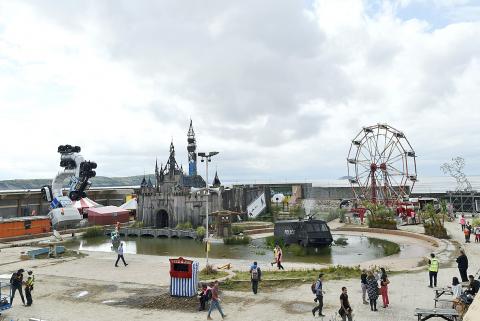An anarchic amusement park by street artist Banksy that mocked capitalism and consumer culture has brought an economic boom to a faded British seaside town.
Banksy’s Dismaland “bemusement park” transformed a derelict outdoor swimming pool in Weston-Super-Mare into a macabre parody of a theme park, complete with a derelict castle, a dead Cinderella and a Grim Reaper in a bumper car.
Local officials say the attraction, which closed yesterday after five weeks, drew more than 150,000 people to the southwest England town of 75,000.

Photo: Reuters
Fans from around the world snapped up all available tickets — limited to 4,000 a day — for the event billed as a “festival of art, amusements and entry-level anarchism.”
A final concert on Friday night featured performances by groups such as De La Soul, Pussy Riot and Blur singer Damon Albarn.
Tourism body Visit Somerset said the exhibition had brought £20 million (US$30 million) to a region that has struggled since foreign vacations replaced local seaside holidays for many Britons.
Officials hope to use the shuttered site for future art and performance events.
Banksy said the project was not a swipe at Disney, despite its familiar-looking castle logo.
It satirized the tourism and entertainment industries, with exhibits including a sculpture of a woman being attacked by a cloud of seagulls and a pond where visitors could steer model boats crammed with migrants.
The site also featured work by about 50 international and British artists.
The artist told the Sunday Times newspaper he was inspired by the seasonal theme parks that pop up at Christmas “where they stick some antlers on an Alsatian dog” and spray fake snow around.
“It’s ambitious, but it’s also crap,” he said. “I think there’s something very poetic and British about all that.”
Banksy, who has never disclosed his full identity, began his career spray-painting buildings in his home town of Bristol — near Weston — and has become one of the world’s best-known street artists.
His often satirical works have sold for as much as US$1.8 million at auction.

AI SERVER DEMAND: ‘Overall industry demand continues to outpace supply and we are expanding capacity to meet it,’ the company’s chief executive officer said Hon Hai Precision Industry Co (鴻海精密) yesterday reported that net profit last quarter rose 27 percent from the same quarter last year on the back of demand for cloud services and high-performance computing products. Net profit surged to NT$44.36 billion (US$1.48 billion) from NT$35.04 billion a year earlier. On a quarterly basis, net profit grew 5 percent from NT$42.1 billion. Earnings per share expanded to NT$3.19 from NT$2.53 a year earlier and NT$3.03 in the first quarter. However, a sharp appreciation of the New Taiwan dollar since early May has weighed on the company’s performance, Hon Hai chief financial officer David Huang (黃德才)

The Taiwan Automation Intelligence and Robot Show, which is to be held from Wednesday to Saturday at the Taipei Nangang Exhibition Center, would showcase the latest in artificial intelligence (AI)-driven robotics and automation technologies, the organizer said yesterday. The event would highlight applications in smart manufacturing, as well as information and communications technology, the Taiwan Automation Intelligence and Robotics Association said. More than 1,000 companies are to display innovations in semiconductors, electromechanics, industrial automation and intelligent manufacturing, it said in a news release. Visitors can explore automated guided vehicles, 3D machine vision systems and AI-powered applications at the show, along

FORECAST: The greater computing power needed for emerging AI applications has driven higher demand for advanced semiconductors worldwide, TSMC said The government-supported Industrial Technology Research Institute (ITRI) has raised its forecast for this year’s growth in the output value of Taiwan’s semiconductor industry to above 22 percent on strong global demand for artificial intelligence (AI) applications. In its latest IEK Current Quarterly Model report, the institute said the local semiconductor industry would have output of NT$6.5 trillion (US$216.6 billion) this year, up 22.2 percent from a year earlier, an upward revision from a 19.1 percent increase estimate made in May. The strong showing of the local semiconductor industry largely reflected the stronger-than-expected performance of the integrated circuit (IC) manufacturing segment,

NVIDIA FACTOR: Shipments of AI servers powered by GB300 chips would undergo pilot runs this quarter, with small shipments possibly starting next quarter, it said Quanta Computer Inc (廣達), which supplies artificial intelligence (AI) servers powered by Nvidia Corp chips, yesterday said that AI servers are on track to account for 70 percent of its total server revenue this year, thanks to improved yield rates and a better learning curve for Nvidia’s GB300 chip-based servers. AI servers accounted for more than 60 percent of its total server revenue in the first half of this year, Quanta chief financial officer Elton Yang (楊俊烈) told an online conference. The company’s latest production learning curve of the AI servers powered by Nvidia’s GB200 chips has improved after overcoming key component